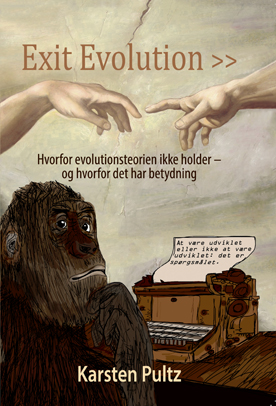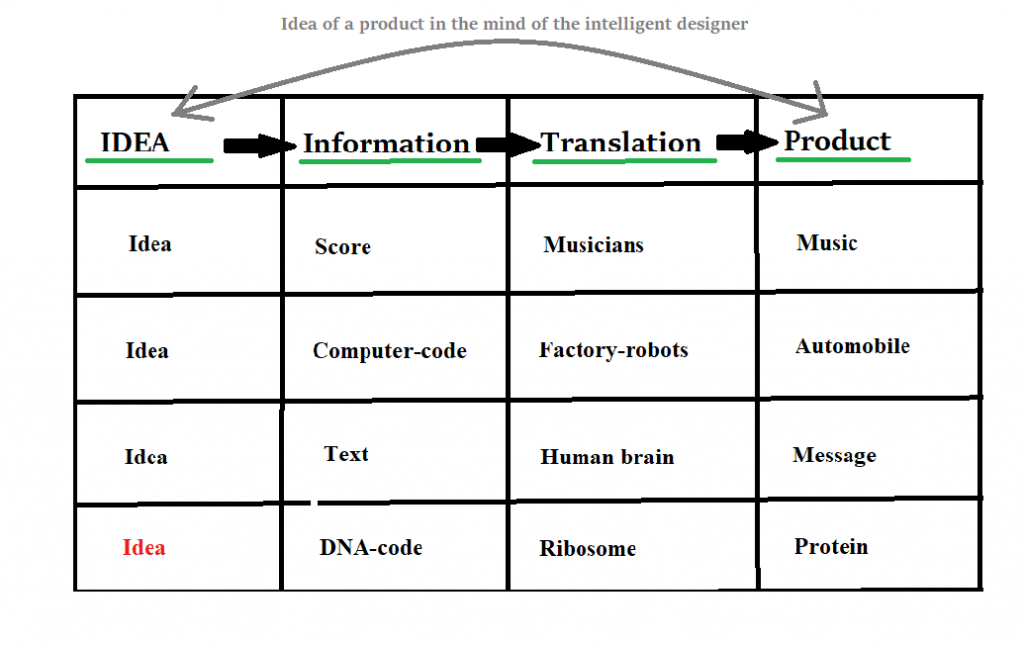
Karsten Pultz, author of Exit Evolution, follows up his earlier post, “Why Random Processes Cannot Produce Information: A New Approach To The Argument” with this one:
Stephen Meyer has often said that if we trace information back to its source, we always come to a mind, not a material process.
I have always regarded Meyer’s statement as self-evident, based on my own intuition but, ever since I heard it for the first time, I have pondered on how to make a persuasive argument for this postulate. My post from January 3 attempted to make a case for information always being related to the realization of an idea. If that is true, it would automatically render information impossible as a product of random processes because ideas always come from a mind.
Here I offer some further thoughts.
My main postulate is that information is strictly tied to an idea, a product, or a message. I cannot see how it is possible to have information prior to the idea, product, or message because information is an abstract representation of those things. How can an abstract representation exist prior to the phenomenon which it represents?
Information and music

I’m a composer and when I compose a brass quintet for my friends in the Royal Danish Orchestra, I start by composing the music. The abstract representation, the score (sheet music), is something I write after having gotten all the musical ideas. The score is the information which conveys the specific musical ideas to the musicians. The musicians are the translators who turn the information into the product, the music. So we have, as with the DNA code, an abstract representation, namely the score, which is translated like the process in the ribosome, into a final product, the music, which is equivalent to the protein.
As mentioned in my last post, we find the same three-part system of code-translation-product in modern car production.
In the case of music I know from experience that the idea is primary, the information, in this case the score, is secondary. I do not write a score before the music is created.
I think it is reasonable to raise the question whether the abstract representation of a protein could come about through means of random processes that did not have it in mind. It’s like having means without ends.
Information is the means, the idea is the end, we cannot have means before we have ends. Ends are purposeful and purposefulness is only found where we have intelligent causality. The neo-Darwinists want to put the cart before the horse by essentially having information produce the idea. This ludicrous concept runs, of course ,all the way through philosophical materialism.
Aboutness
The most important feature about information is that it is “about” something other than itself. A gene is nothing in itself, it is about the protein. The score is nothing in itself, it is about the music. A text is nothing in itself, it is about the message. The computer codes that run the robots in a car factory are nothing in themselves, they are about the final product, the automobile.

In the above illustration, every word written in black should be non-controversial truths. The only word written in red is the one that is not a provable fact. Should the word “idea” in red be replaced by the words “random process,” as the neo-Darwinist think? My chart makes clear that that is not the obvious inference to make.
My question to the neo-Darwinists is this: When did the DNA code move from being a random chemical product to being “about” the products for which it codes? When does the aboutness come about?
The phenomenon of aboutness is found elsewhere only in human thoughts. Thoughts are nothing by themselves. They are real but they do not exist detached from what they are about. I see the same with information, that it is intrinsically linked to what it is about. The DNA code is about the organism, I think that this would be hard for neo-Darwinists to deny, so looking at an organism today, they can hardly claim that DNA is not information. But they somehow imagine that we can have information, the DNA, come into existence without it being about the organism. And then later by some mysterious process, the aboutness arises out of the blue.
If the neo-Darwinists deny that DNA contains information, I have just delivered some empirical evidence to claim otherwise. The car factory, music, and written language are similar to organisms by having the three part system of code-translation-product, and you cannot within the frames of sanity claim that computer code, scores, and text have nothing to do with information. Hence it logically follows that the DNA code also is information.
If you want to make the claim that the DNA code is not information, you would simply have to deny there’s any connection between DNA and the organism it codes for.
I think it is rather obvious that a code sequence doesn’t possess any intrinsic informative value unless it is tied to a product. Without accepting the connection between information and product we have no way of defining what information is and the word becomes meaningless.
It’s worth mentioning that the three part system code-translation-product also is irreducibly complex since none of them makes sense without the others (see the previous post)
Am I then saying that we (proponents of ID) should give up showing the neo-Darwinists that there aren’t enough probabilistic resources to have information produced by random processes. No, absolutely not. The thoughts I here have shared are just an attempt to put some meat on Meyers bones when he claims that if we trace information back to its source, we always come to a mind.
See also: Karsten Pultz: Why Random Processes Cannot Produce Information: A New Approach To The Argument